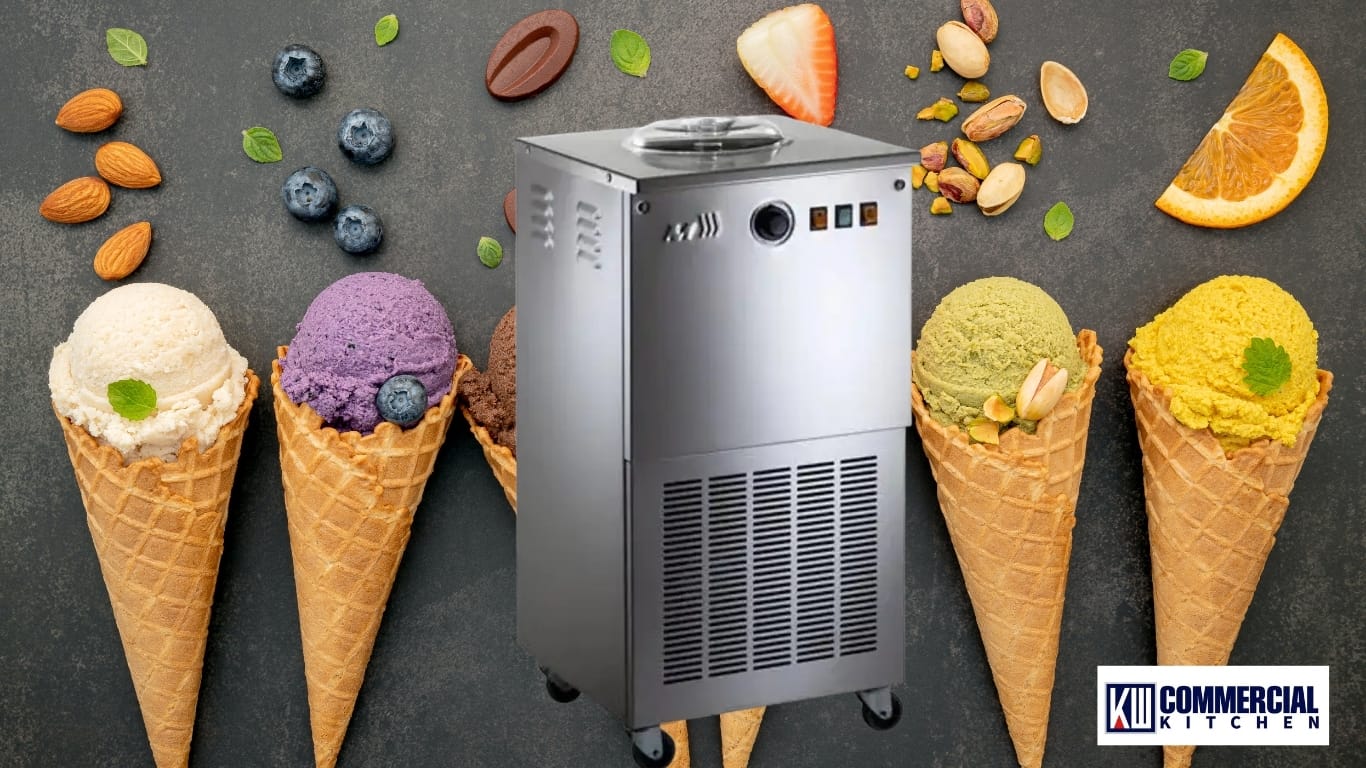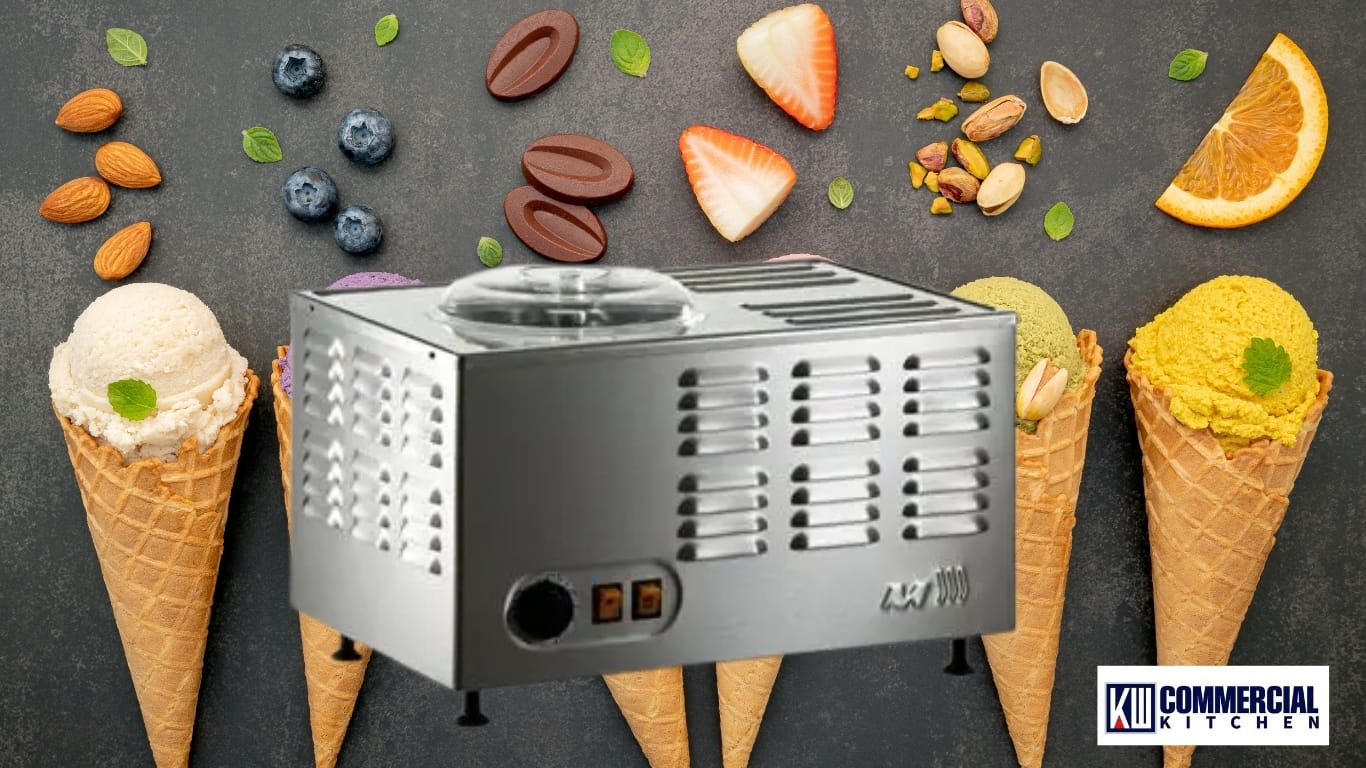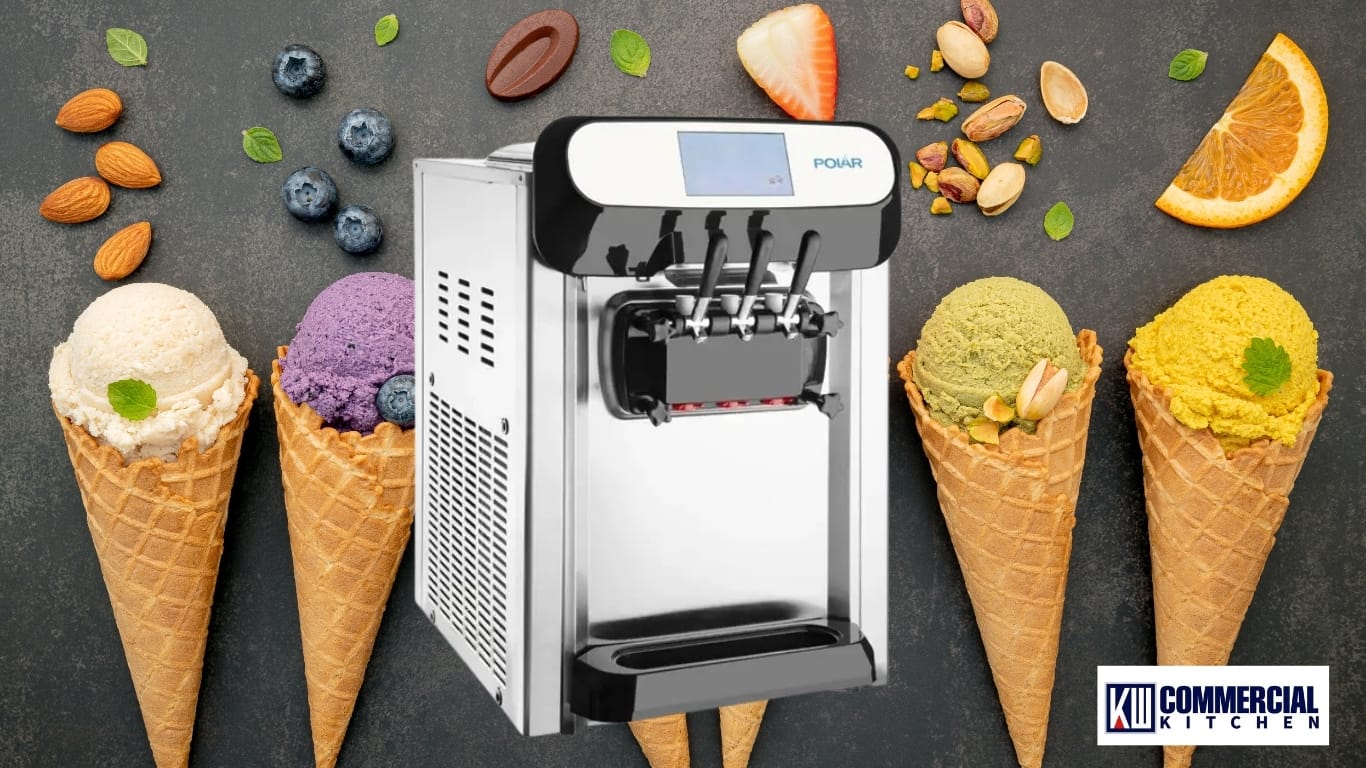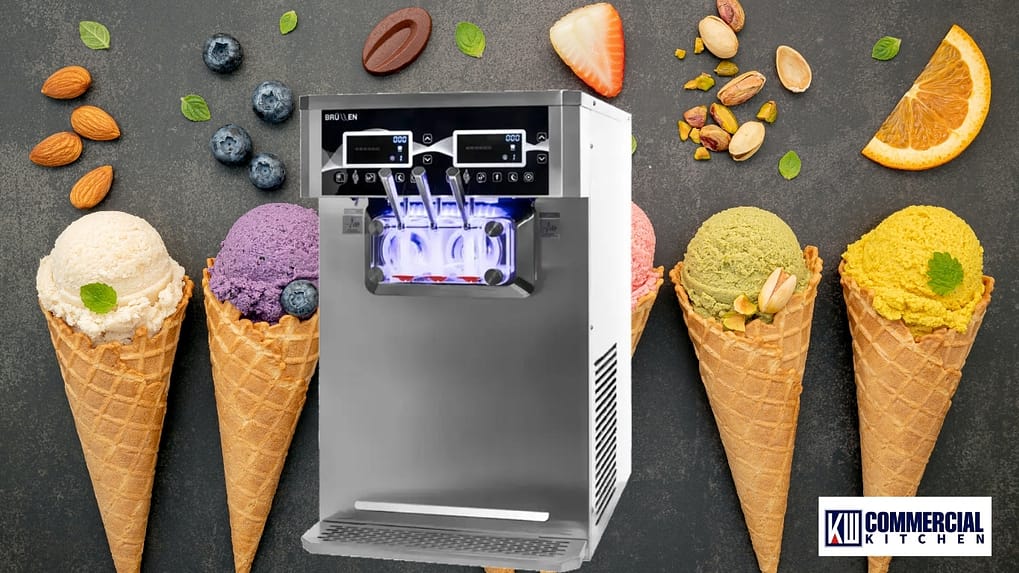The Ultimate Guide to Commercial Cream Ice Machines in Australia (2025)
Introduction: Australia’s Booming Ice Cream & Gelato Industry
Australia’s premium dining, café culture, and specialty dessert industries have experienced remarkable growth over the past decade, with the Australian Restaurant and Catering Association reporting significant expansions in dessert-focused venues and specialty cafés. From Sydney’s iconic gelato parlours to Melbourne’s artisanal dessert cafés, and Brisbane’s thriving food scene, consumer preferences for premium frozen desserts have never been higher.
This heightened consumer interest is driving Australian businesses toward investing in versatile commercial cream ice machines, capable of producing everything from classic soft serve and traditional Italian gelato to dairy-free, vegan-friendly frozen desserts. According to recent consumer trend reports, the demand for unique, high-quality ice cream and gelato offerings is forecasted to continue rising steadily, providing significant business opportunities for Australian hospitality operators and entrepreneurs.
This comprehensive guide aims to assist Australian restaurant and café owners, dessert bar operators, and hospitality entrepreneurs in selecting the ideal commercial cream ice machines. By thoroughly exploring different machine types, features, industry trends, and critical selection criteria, you’ll be equipped with actionable insights to elevate your frozen dessert offerings and strengthen your competitive position in Australia’s rapidly evolving hospitality landscape.
Understanding Commercial Cream Ice Machines: Types and Features
Selecting the ideal commercial cream ice machine is crucial for businesses aiming to produce consistently high-quality frozen desserts. Understanding the types and features available ensures you can precisely match your equipment choice to your specific business needs.
Main Types of Commercial Ice Cream Machines in Australia
1. Soft Serve Machines
Soft serve machines produce smooth, airy ice cream, popular in fast-paced cafés, dessert bars, and food trucks. Brands like Brullen offer versatile countertop and floor-standing options, ideal for consistent output in high-demand scenarios.
2. Gelato Machines (Artisanal Italian-Style)
Gelato machines, like those from Musso, focus on dense, flavour-rich frozen desserts. Suitable for upscale cafés, restaurants, and gelaterias, these machines are renowned for authentic Italian craftsmanship, consistently creamy textures, and precise temperature control.
3. Batch Freezers (Hard Ice Cream)
Batch freezers produce traditional hard ice cream, typically served in scoops. Ideal for ice cream parlours, specialty dessert shops, and restaurants, these machines require careful consideration of capacity and freezing speed to meet high-volume commercial demands.
Countertop vs Floor-standing Commercial Ice Cream Machines
Choosing between countertop and floor-standing models depends on your available space, daily output, and operational environment:
| Feature | Countertop Machines | Floor-standing Machines |
|---|---|---|
| Ideal Venues | Cafés, food trucks, kiosks | Restaurants, busy dessert shops, gelaterias |
| Capacity | Low to Medium | Medium to High |
| Space Requirement | Compact spaces, portable setups | Permanent installation, ample space required |
Core Technical Specifications and Selection Criteria
To optimise performance and profitability, consider these essential criteria:
- Hourly Production & Capacity: Select a machine matching your busiest service periods to maintain consistent product availability.
- Power Consumption & Energy Efficiency: Prioritise machines with energy-efficient ratings to lower operational costs and promote sustainability.
- Certification and Compliance: Always select machines certified to Australian standards including FSANZ food safety guidelines and Energy Safe Victoria requirements to ensure safety, legality, and ease of use.

Market Demand and Consumer Trends in Australia’s Frozen Dessert Industry
Australia’s commercial ice cream and gelato market continues to flourish, as highlighted in the latest IBISWorld reports, which project steady growth driven by changing consumer preferences and innovative product offerings.
Emerging Consumer Preferences and Product Trends
Recent consumer research highlights the rising popularity of plant-based, dairy-free, and allergen-sensitive frozen dessert products. With increasing health consciousness among Australians, venues offering vegan-friendly and lactose-free options are witnessing significant business growth.
City-by-City Commercial Ice Cream Trends in Australia
| City | Growth Factors |
|---|---|
| Sydney | High demand for artisanal gelato and vegan desserts. |
| Melbourne | Strong market for gourmet and experimental ice cream flavours. |
| Brisbane | Growing interest in plant-based desserts and specialty soft serves. |
Authoritative Regulations & Compliance: What Australian Businesses Need to Know
When choosing commercial cream ice machines or gelato makers, Australian businesses must prioritise compliance with essential food safety and equipment standards. Adhering to these standards ensures not only safe and hygienic operations but also avoids potential legal complications and costly penalties.
Food Safety Standards (FSANZ)
Food Standards Australia New Zealand (FSANZ) provides stringent guidelines for food safety, particularly concerning frozen dairy and plant-based desserts. Australian businesses operating commercial ice cream machines must comply with FSANZ Standard 3.2.2, which requires:
- Regular cleaning and sanitising schedules documented and followed consistently.
- Monitoring and maintaining precise product temperature controls to prevent bacterial growth.
- Clear labelling for allergen management, particularly when introducing dairy-free or plant-based frozen desserts.
Energy Safe Victoria – Equipment Installation & Usage
In Victoria and across Australia, Energy Safe Victoria outlines safety regulations related to the installation and maintenance of electrical and refrigeration equipment used in food service establishments. For commercial cream ice machines and gelato machines, key requirements include:
- Proper electrical certification (SAA Certification), ensuring compliance with AS/NZS 60335 standards.
- Regular equipment inspection to verify safety and efficiency.
- Use of licensed refrigeration and electrical contractors for installation and periodic maintenance.
Australian Certification Marks Explained
| Certification | Meaning & Importance |
|---|---|
| AGA (Australian Gas Association) | Indicates compliance with Australian gas safety standards (important if gas cooling/refrigeration equipment is involved). |
| SAA (Standards Australia Approval) | Certifies electrical appliances meet stringent Australian safety requirements. |
| FSANZ Compliance | Ensures food safety standards and hygiene practices are consistently maintained. |
By choosing commercial cream ice machines from reputable brands such as Musso or Brullen, Australian businesses can be confident of meeting these stringent compliance and safety regulations, safeguarding both their customers and their reputation.
Case Study: Success Story from a Popular Melbourne Dessert Café
Located in the vibrant heart of Melbourne’s CBD, Sweet Indulgence Café (actual café, name anonymised for privacy) faced significant challenges in its early operations, primarily due to outdated ice cream equipment that struggled to keep up with rising customer demand. Before investing in new equipment, the café grappled with operational inefficiencies, inconsistent dessert textures, and escalating energy bills.
Initial Challenges Faced by the Café
- Inadequate Production Capacity: The previous equipment produced only 5 litres of gelato per hour, unable to meet peak-hour demands.
- High Operational Costs: Frequent maintenance and inefficient cooling mechanisms inflated energy bills, averaging AUD $600 per month.
- Inconsistent Product Quality: Variations in temperature and inadequate freezing capacity resulted in noticeable inconsistencies in texture and taste.
The Solution: Upgrading to Musso Gelato Machines
After thorough research and consultation, Sweet Indulgence Café upgraded to two Musso commercial gelato machines, renowned for their durability, capacity, and consistency. Immediately, the café experienced transformative improvements:
- Production Capacity Improved: Hourly production increased from 5 litres to 15 litres, effectively meeting and surpassing peak-time demand.
- Energy Cost Reduction: With Musso’s energy-efficient refrigeration system, monthly electricity bills dropped from AUD $600 to AUD $450—a notable 25% reduction.
- Enhanced Product Consistency: Precise temperature controls delivered consistently creamy textures, significantly enhancing customer satisfaction and dessert quality.
| Performance Metrics | Before Musso | After Musso Installation | Improvement % |
|---|---|---|---|
| Hourly Production (litres) | 5 litres | 15 litres | 200% ↑ |
| Monthly Energy Cost | $600 | $450 | 25% ↓ |
| Customer Satisfaction Rate | 75% | 92% | 17% ↑ |
Owner’s Feedback & Customer Testimonials
“Since upgrading to Musso, our desserts have never tasted better, and our business has flourished,” said Emma Harris, the café’s owner. Regular customers praised the noticeable improvement in gelato consistency, citing this as a primary reason for increased visits and referrals.
The real-world success of Sweet Indulgence Café underscores the profound impact that selecting high-quality commercial cream ice machines can have on operational efficiency, product excellence, customer satisfaction, and overall profitability for Australian hospitality businesses.

Practical Guide: How to Choose the Best Commercial Ice Cream Machine for Your Business
Assess Your Actual Needs: Matching Capacity, Output & Application
Selecting the perfect commercial ice cream machine requires a careful evaluation of your business’s unique needs. Key factors include the type of frozen desserts you wish to offer (e.g., soft serve, gelato, frozen yoghurt), your average daily serving volume, peak-hour demands, and available space in your kitchen or serving area.
- Capacity and Output: Smaller venues, such as food trucks or cafés, typically benefit from countertop machines producing 5-10 litres per hour. Busy gelato shops or restaurants, however, should consider larger floor-standing units capable of 15-30 litres per hour.
- Operational Environment: Mobile setups require compact, portable machines, while permanent venues can accommodate larger, higher-output models.
Cleaning, Maintenance & Long-Term Cost Analysis
Regular cleaning and maintenance significantly impact both machine longevity and operational costs. On average, well-maintained commercial ice cream machines last between 10 to 15 years, delivering consistent product quality.
- Cleaning Frequency: FSANZ recommends daily cleaning for dairy-based machines, with weekly deep cleans to ensure hygiene standards. Typical cleaning costs, including labour and supplies, average approximately AUD $50–$80 per week.
- Annual Maintenance Costs: Scheduled professional maintenance typically costs between AUD $400–$600 annually. This proactive approach prevents costly breakdowns and prolongs machine life.
| Expense Category | Estimated Annual Cost (AUD) |
|---|---|
| Cleaning & Sanitisation | $2,600 – $4,160 |
| Routine Maintenance | $400 – $600 |
| Total Annual Cost (Avg.) | $3,000 – $4,700 |
Recommended Brands in the Australian Market: Pros & Cons
Two highly recommended brands for Australian businesses include Musso and Brullen:
- Musso (Italy) – Ideal for authentic gelato and artisan ice cream. Premium build quality, unmatched durability, but typically higher upfront costs.
- Brullen (Australia) – Excellent for soft serve, frozen yoghurt, and specialty vegan desserts. Offers superior flexibility, strong local support, customisable designs, but slightly higher-priced compared to entry-level competitors.
Expert Tips: Maximizing ROI and Performance from Your Commercial Cream Ice Machine
Proper Installation and Initial Setup
Correct installation is crucial for optimal machine performance and longevity. Engaging qualified Australian refrigeration technicians ensures compliance with Energy Safe Victoria regulations and optimal operational efficiency. Installation should always include:
- Proper calibration of refrigeration settings for Australian ambient temperatures.
- Placement ensuring sufficient airflow, avoiding overheating and unnecessary wear.
- Detailed training for staff on correct operational procedures.
Daily Cleaning and Scheduled Maintenance Plan
Adhering to the manufacturer-recommended cleaning and maintenance schedule is key to maintaining hygiene and extending equipment lifespan. An ideal maintenance routine includes:
- Daily: Clean dispensing nozzles, blades, and freezing chambers to prevent bacteria and residue build-up.
- Weekly: Deep clean and sanitise internal refrigeration components, seals, and trays.
- Annually: Comprehensive professional inspection, recalibration, and preventative servicing to identify potential issues early.
Practical Tips for Extending Equipment Life & Reducing Costs
- Temperature Monitoring: Regular checks prevent over-freezing, reducing energy usage and wear on refrigeration units.
- Staff Training: Investing in staff training minimises operator errors, which cause overuse and machine strain.
- Use Genuine Parts: Always utilise authorised spare parts during maintenance, ensuring compatibility and preventing future breakdowns.
Frequently Asked Questions by Australian Business Owners (FAQ)
1. What Is the Average Lifespan and Long-term Cost of Commercial Cream Ice Machines?
High-quality commercial ice cream machines typically last between 10-15 years when properly maintained. Annual maintenance and operational costs (cleaning, energy, minor repairs) range between AUD $3,000–$4,700 annually.
2. What Regulations Apply to Operating Ice Cream Machines in Australia?
Businesses must adhere to FSANZ Standard 3.2.2 for food safety, Energy Safe Victoria’s regulations for electrical compliance, and ensure their equipment holds SAA certification (AS/NZS 60335 standards).
3. How Do Climate Conditions (e.g., Queensland vs Tasmania) Affect Machine Performance?
Warmer climates like Queensland increase machine workload due to higher ambient temperatures, necessitating regular refrigeration checks and maintenance. In cooler climates like Tasmania, reduced external temperatures can lower operational strain, extending equipment life.
4. How Can I Determine When My Existing Ice Cream Machine Needs Upgrading?
- Frequent breakdowns or increased repair costs exceeding annual maintenance budget.
- Reduced consistency in product quality and customer complaints about texture.
- Noticeable increases in energy bills indicating declining machine efficiency.
- Growth in customer demand exceeding your machine’s maximum output.
Regularly reassessing equipment performance against business growth and customer feedback is the best strategy to identify timely upgrades.
Opportunities for Australian Businesses: Where to Profit from Ice Cream Innovation
Market Trends and Growth Opportunities (2025–2028)
According to recent IBISWorld industry reports, Australia’s ice cream and frozen dessert sector is forecasted to experience steady growth of around 2.5% annually over the next three years. This growth is driven by rising consumer demand for premium-quality products, particularly within urban markets such as Sydney, Melbourne, and Brisbane. Businesses looking to capitalise on this expanding market should pay close attention to emerging consumer preferences and adapt quickly to shifting trends.
Emerging Demand for Plant-Based and Dairy-Free Desserts
One of the most significant opportunities in the Australian market lies in catering to the rapidly expanding demand for plant-based, vegan, and lactose-free frozen desserts. Recent consumer trend reports indicate that approximately 12% of Australians now regularly seek dairy-free alternatives due to dietary preferences or lactose intolerance, and this number is expected to grow further.
Businesses offering plant-based or dairy-free gelato and ice cream options typically enjoy higher profit margins—approximately 15-25% above traditional dairy-based products—due to consumers’ willingness to pay premium prices for specialised dietary options. Successful examples include Melbourne-based vegan gelato shops that have reported revenue growth exceeding 30% annually since introducing plant-based lines.
| Product Type | Market Demand Growth (Forecast) | Average Premium Pricing |
|---|---|---|
| Plant-based Ice Cream | 8-10% annually | +20–25% |
| Dairy-free Gelato | 10-12% annually | +15–20% |
Targeting the Mid-to-High-End Premium Segment
Another lucrative opportunity lies in targeting the mid-to-high-end segment through innovative, gourmet frozen dessert offerings. Australian consumers increasingly seek unique flavour profiles, premium ingredients, and artisanal production methods. Businesses can achieve higher profitability by positioning their brands towards gourmet and niche markets, attracting customers willing to pay premium prices for exceptional quality.
For example, niche dessert cafés in Sydney’s Inner West have successfully leveraged premium ingredients like organic dairy, locally sourced fruits, or imported Italian chocolates to justify price points 30% higher than standard ice cream parlours. Introducing limited-edition seasonal flavours or customisable dessert experiences also significantly enhances customer engagement and brand differentiation, leading to increased customer loyalty and sustained profitability.
- Product Innovation: Regularly introduce new and creative flavours or limited-time offers.
- Premium Ingredients: Source local, organic, and high-quality ingredients to justify higher price points.
- Unique Customer Experience: Offer interactive serving options, customisation, and experiential dining to attract upscale clientele.
By focusing on these emerging trends and innovative strategies, Australian businesses can effectively differentiate themselves, capturing significant profit potential in the growing premium frozen dessert market.

Common Challenges and How to Overcome Them: Real Insights from Industry Experts
Temperature Control Issues Affecting Product Quality
One of the most common challenges faced by Australian hospitality operators using commercial ice cream machines is inconsistent temperature management. Slight fluctuations can drastically affect texture, causing icy, grainy, or overly soft desserts. Industry expert Mark Robinson, a refrigeration specialist from Melbourne, recommends investing in machines with precise digital temperature controls and regular calibration checks every six months to ensure optimal performance.
Staff Training & Effective Operational Management
Proper staff training remains crucial yet frequently overlooked. According to leading dessert café owner Sarah Mitchell from Brisbane, “Well-trained operators not only improve product consistency but significantly reduce equipment downtime.” She suggests comprehensive initial training followed by quarterly refresher courses. Creating clear, visual operational guides and checklists helps employees efficiently handle equipment, maintain hygiene standards, and swiftly resolve minor issues without prolonged downtime.
Cost Control & Maximizing Long-term Profitability
Controlling operational costs to maintain healthy profit margins can challenge businesses of any size. According to industry consultant Alex Nguyen, businesses should adopt proactive maintenance schedules rather than reactive repairs, reducing unexpected breakdown costs by up to 30%. He also advises negotiating annual service contracts with reputable local refrigeration specialists to manage predictable maintenance expenses effectively.
- Regular Calibration: Schedule routine checks to maintain consistent temperatures and prevent quality fluctuations.
- Ongoing Staff Development: Conduct periodic training sessions to enhance operational efficiency.
- Proactive Maintenance Strategy: Budget yearly maintenance costs in advance, negotiating fixed-price servicing contracts for predictable expenditure.
By addressing these common operational challenges through strategic planning, training, and proactive management, Australian hospitality businesses can significantly improve their ice cream equipment reliability, customer satisfaction, and overall profitability.
Conclusion & Call to Action: Elevate Your Dessert Business with the Right Commercial Cream Ice Machine
Choosing the correct commercial cream ice machine is more than an operational necessity—it is a strategic investment that significantly influences the success and sustainability of your hospitality or dessert business in Australia’s competitive market. The right equipment not only enhances your product’s consistency and quality but directly contributes to operational efficiency, lower running costs, and increased profitability.
Given the rapidly evolving consumer preferences towards premium, dairy-free, and gourmet frozen desserts, reviewing and potentially upgrading your existing equipment now will position your business at the forefront of innovation. Businesses that proactively adapt by selecting versatile, reliable, and compliant ice cream machines from trusted brands like Musso and Brullen are already seeing substantial growth in customer satisfaction, repeat business, and overall revenue.
We encourage Australian hospitality operators to critically assess their current dessert production capabilities. Is your equipment meeting current market demands? Is it efficient, reliable, and compliant with evolving Australian standards? If not, now is the ideal time to upgrade and capitalise on emerging market opportunities.
Take the next step today:
- Explore KW Commercial’s Premium Cream Ice Machine Selection
- Contact KW Commercial for personalised, expert consultation and free professional advice tailored to your business needs.
Make the smart investment that guarantees your long-term business success. Partner with KW Commercial and elevate your dessert offerings today.

